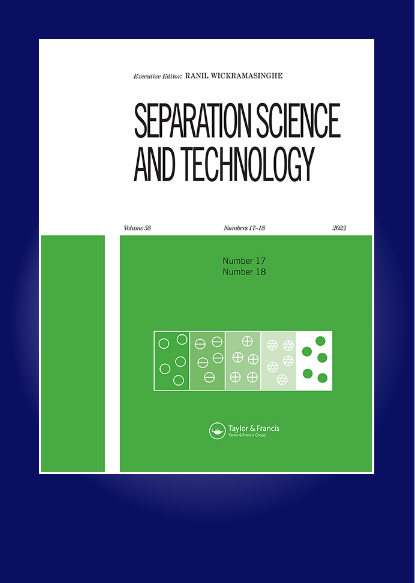土壤中四环素的污染现状及去除方法综述
IF 2.3
4区 工程技术
Q3 CHEMISTRY, MULTIDISCIPLINARY
引用次数: 10
摘要
摘要由于四环素类抗生素(TCs)在畜牧业中的广泛使用,一直造成土壤污染。TCs不仅通过多渠道进入土壤和水体,而且在土壤和水体中长期积累。它在土壤、农业用地中更为丰富。首先,应该探索去除或降解tc的有效方法。本文综述了TCs的产生、发展及存在的问题。然后重点介绍了TCs对微生物、动物和植物的毒性和影响。此外,在接下来的章节中,介绍了微生物、植物、动物生物降解方法,总结了现阶段用于土壤TCs去除的物种和植物。同时,深入分析了高级氧化工艺的原理机理,以填补这一空白。此外,还介绍了基于可持续生物能量学的微生物燃料电池在土壤TCs去除方面的应用前景。由于碳质物质与土壤的相互作用,深入分析了土壤环境下吸附方法的特点。关键词:抗生素污染生物降解电化学土壤四环素披露声明作者声明,他们没有已知的竞争经济利益或个人关系,可能会影响本文报道的工作。由于四环素类抗生素(TCs)在家畜养殖中的广泛使用,一直造成土壤污染。有机碳不仅可以通过多种途径进入土壤和水体,而且可以长期在土壤和水体中积累。它在土壤中更为丰富,尤其是在农田中。因此,应该探索去除或降解TCs的有效方法。本文前两节综述了有机碳的产生、发展及其存在的问题。第三部分着重于TCs对微生物、动物、植物的毒性和影响。此外,在接下来的章节中,介绍了微生物、植物、动物生物降解方法,总结了现阶段用于土壤TCs去除的物种和植物。同时,深入分析了高级氧化工艺的原理机理,填补了这一空白。此外,还介绍了基于可持续生物能量学的微生物燃料电池在土壤TCs去除方面的应用前景。由于碳质物质与土壤的相互作用,深入分析了土壤环境下吸附方法的特点。对对比和反思的批判性分析在每个部分的末尾呈现。本文章由计算机程序翻译,如有差异,请以英文原文为准。
A review on current pollution and removal methods of tetracycline in soil
ABSTRACTDue to the widespread use of tetracyclines antibiotics (TCs) in livestock breeding, TCs has always caused soil pollution. TCs cannot only enter soil and water bodies through multiple channels but also accumulate in them over a long period. It is more abundant in soils, agricultural land. Primarily, should explore efficient methods for removing or degrading TCs. This review provides an overview of the birth, development and problem of soil contamination of TCs. Then focuses on the toxicity and effects of TCs on microorganisms, animals, and plants. Furthermore, in the following chapters, microbial -, plant -, animal – biodegradation methods are introduced to summarize the species and plants applied in soil TCs removal at this stage. Meanwhile, the principle mechanism of advanced oxidation processes is analyzed deeply to fill the gap. In addition, a case of microbial fuel cells based on sustainable bioenergetics with promising prospects for soil TCs removal is presented. Due to the interaction between carbonaceous materials and soil, the characteristics of adsorption method under soil environment are deeply analyzed.KEYWORDS: Antibiotic pollutionbiodegradationelectrochemistrysoiltetracyclines Disclosure statementThe authors declare that they have no known competing financial interests or personal relationships that could have appeared to influence the work reported in this paper.Statement of noveltyDue to the widespread use of tetracyclines antibiotics (TCs) in livestock breeding, TCs has always caused soil pollution. TCs are not only able to enter soil and water bodies through multiple channels but also accumulate in them over a long period of time. It is more abundant in soils, especially agricultural land. Hence, efficient methods for removing or degrading TCs should be explored. The first two sections of this review provide an overview of the birth, development and problem of soil contamination of TCs. The third section focuses on the toxicity and effects of TCs on microorganisms, animals, plants. Furthermore, in the following chapters, microbial -, plant -, animal – biodegradation methods are introduced to summarize the species and plants applied in soil TCs removal at this stage. Meanwhile, the principle mechanism of advanced oxidation processes is analyzed in depth to fill the gap. In addition, a case of microbial fuel cell based on sustainable bioenergetics with promising prospects for soil TCs removal is presented. Due to the interaction between carbonaceous materials and soil, the characteristics of adsorption method under soil environment are deeply analyzed. A critical analysis of contrast and reflection is presented at the end of each section.
求助全文
通过发布文献求助,成功后即可免费获取论文全文。
去求助
来源期刊

Separation Science and Technology
工程技术-工程:化工
CiteScore
6.10
自引率
3.60%
发文量
131
审稿时长
5.7 months
期刊介绍:
This international journal deals with fundamental and applied aspects of separation processes related to a number of fields. A wide range of topics are covered in the journal including adsorption, membranes, extraction, distillation, absorption, centrifugation, crystallization, precipitation, reactive separations, hybrid processes, continuous separations, carbon capture, flocculation and magnetic separations. The journal focuses on state of the art preparative separations and theoretical contributions to the field of separation science. Applications include environmental, energy, water, and biotechnology. The journal does not publish analytical separation papers unless they contain new fundamental contributions to the field of separation science.
 求助内容:
求助内容: 应助结果提醒方式:
应助结果提醒方式:


